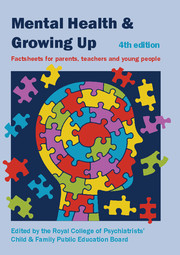Book contents
- Frontmatter
- Contents
- Contributors
- Factsheets for young people
- Factsheets for parents, carers and anyone who works with young people
- 1 Good parenting
- 2 The restless and excitable child
- 3 Dealing with tantrums
- 4 Children who soil or wet themselves
- 5 Sleep problems in childhood and adolescence
- 6 Behavioural problems and conduct disorder
- 7 Attention-deficit hyperactivity disorder (ADHD)
- 8 The child with general learning disability
- 9 Specific learning difficulties
- 10 Autism and Asperger syndrome
- 11 Depression in children
- 12 Worries and anxieties: helping children to cope
- 13 Divorce or separation of parents: the impact on children and adolescents
- 14 Death in the family: helping children to cope
- 15 The emotional cost of bullying
- 16 Traumatic stress in children
- 17 Domestic violence: its effects on children
- 18 Child abuse and neglect: the emotional effect
- 19 Drugs and alcohol: what parents need to know
- 20 Self-harm in young people
- 21 Psychosis
- 22 Schizophrenia
- 23 Bipolar disorder in children and adolescents
- 24 Obsessive–compulsive disorder in children and young people
- 25 Eating disorders in young people
- 26 Chronic physical illness: the effects on mental health
- 27 Medically unexplained physical symptoms
- 28 Chronic fatigue syndrome: helping your child get better
- 29 Parental mental illness: the problems for children
- 30 Who's who in CAMHS
27 - Medically unexplained physical symptoms
from Factsheets for parents, carers and anyone who works with young people
Published online by Cambridge University Press: 02 January 2018
- Frontmatter
- Contents
- Contributors
- Factsheets for young people
- Factsheets for parents, carers and anyone who works with young people
- 1 Good parenting
- 2 The restless and excitable child
- 3 Dealing with tantrums
- 4 Children who soil or wet themselves
- 5 Sleep problems in childhood and adolescence
- 6 Behavioural problems and conduct disorder
- 7 Attention-deficit hyperactivity disorder (ADHD)
- 8 The child with general learning disability
- 9 Specific learning difficulties
- 10 Autism and Asperger syndrome
- 11 Depression in children
- 12 Worries and anxieties: helping children to cope
- 13 Divorce or separation of parents: the impact on children and adolescents
- 14 Death in the family: helping children to cope
- 15 The emotional cost of bullying
- 16 Traumatic stress in children
- 17 Domestic violence: its effects on children
- 18 Child abuse and neglect: the emotional effect
- 19 Drugs and alcohol: what parents need to know
- 20 Self-harm in young people
- 21 Psychosis
- 22 Schizophrenia
- 23 Bipolar disorder in children and adolescents
- 24 Obsessive–compulsive disorder in children and young people
- 25 Eating disorders in young people
- 26 Chronic physical illness: the effects on mental health
- 27 Medically unexplained physical symptoms
- 28 Chronic fatigue syndrome: helping your child get better
- 29 Parental mental illness: the problems for children
- 30 Who's who in CAMHS
Summary
What are the causes?
Physical illness or injury may be a factor at the beginning, but when no obvious physical explanation can be found, emotional or psychological factors need to be thought about.
These problems are more common in children and young people who:
• are feeling stressed, for instance about moving school, friendship
problems or not managing schoolwork
• are very sensitive to physical symptoms and pain
• are very sensitive to others
• have low self-esteem
• tend to be fussy or perfectionist
• are very anxious and worry more than most
• worry continuously about the symptoms and their effects on everyday activities – this can cause the symptoms to continue, and even get worse.
Unexplained physical symptoms may also be part of another psychiatric condition, such as depression or anxiety. There may also be a family history of unexplained physical symptoms.
What are the effects of unexplained physical symptoms?
For most children and young people, with appropriate reassurance, the symptoms are short lived. However, for some, everyday life can become very uncomfortable and stressful. Unexplained physical symptoms can also be very worrying for parents.
The symptoms may result in young people:
• missing a lot of school; they may not achieve what they should socially and academically
• seeing less of their friends – this means fewer interests, hobbies and fun
• becoming anxious and depressed
• being less independent than other young people their age.
Who can help?
• Your GPwill be able to assess your child and help decide whether any specialist investigation or treatment is required. If necessary, they will refer your child to the local paediatrician or child and adolescent mental health service (CAMHS).
• Specialists, such as psychiatrists, can help identify the psychological factors that may be contributing to the symptoms, and can also help to distinguish unexplained physical symptoms from other mental health problems, such as depression.
• Talking treatments can help you and your child to manage unexplained physical symptoms better.
• Medication can also play a part, particularly in treating any anxiety and depression that the child may also be experiencing.
- Type
- Chapter
- Information
- Mental Health and Growing UpFactsheets for Parents, Teachers and Young People, pp. 128 - 130Publisher: Royal College of PsychiatristsPrint publication year: 2013



